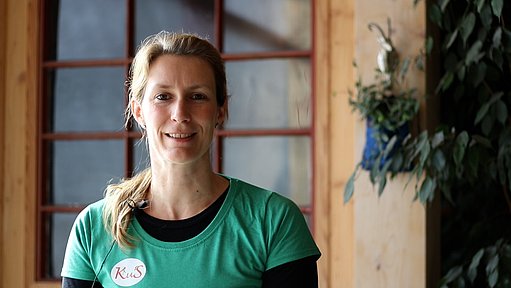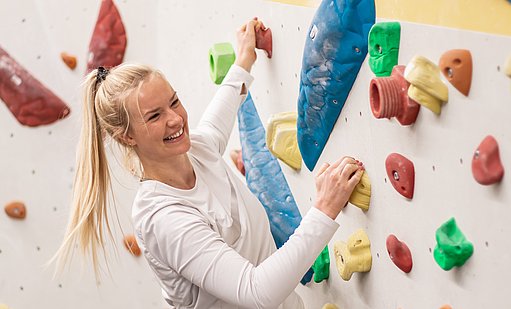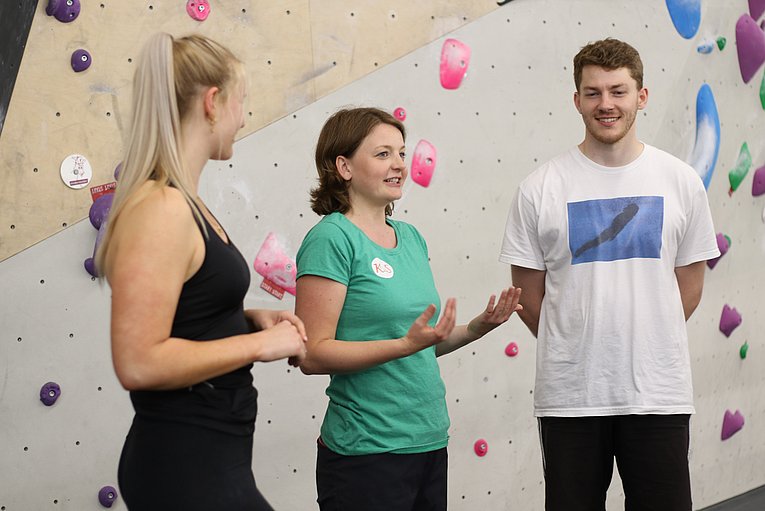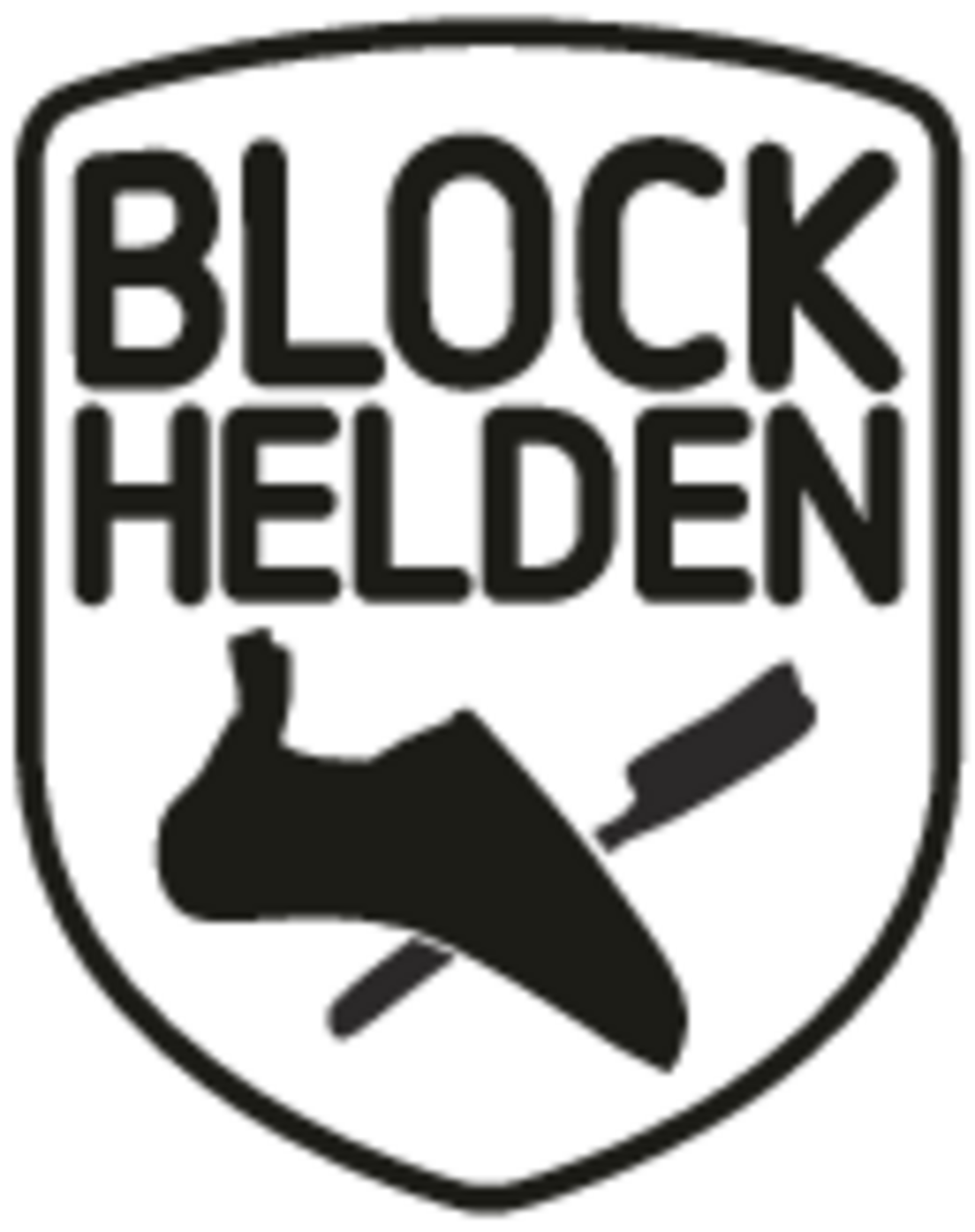Bouldering out of depression
Bouldering Psychotherapy (BPT) combines action-oriented elements of bouldering (climbing on short outdoor boulders or artificial climbing walls without a rope or harness) with psychotherapeutic interventions, including cognitive behavioral therapy and mindfulness as well as relaxation exercises. It was developed for group treatment of individuals with depression and its effectiveness has been demonstrated in several scientific studies. Specifically, when compared with established approaches to depression treatment, Bouldering Psychotherapy has been shown to be more effective than physical activity alone and at least as effective as cognitive behavioral therapy.
The BouldApy manual provides interested therapists who previously participated in our survey with digital access to the evaluated treatment guide of bouldering psychotherapy. In addition, participants are given access to in-depth materials describing the therapy.
By loading the video, you agree that your data will be transmitted to YouTube and that you have read the privacy policy.
Origins of the project
The KuS (Climbing and Mood) project
The “Klettern und Stimmung” (KuS) project (Climbing and Mood) was launched in 2013 by two psychiatric nurses (Stefan Först und Matthias Schopper) and a psychotherapist (project leader Prof. Dr. Katharina Luttenberger). The original idea - namely to combine action-oriented elements of bouldering with psychotherapeutic approaches to treat depression - led to the development of a first version of bouldertherapy (KuS therapy). Although therapeutic bouldering or climbing is and has been offered at a variety of hospitals, up to this point there has been no comprehensive manual for its implementation in the treatment of depression, nor any high-quality studies to evaluate its effectiveness. KuS therapy was integrated into the treatment of outpatients at the Psychiatric Institute Outpatient Clinic of the University Hospital Erlangen (www.kletternundstimmung.de) and evaluated in a pilot study (2013-2015). The promising results of the pilot study enabled us to further develop the therapy and to test its efficacy in a large-scale multicenter study (KuS study). Further development focused primarily on enrichment with psychotherapeutic content and an expansion from 8 to 10 hours. Thus, Bouldering Psychotherapy (BPT) was born. BPT group therapies have so far been conducted mainly in the Erlangen/Nuremberg area, but also in the Munich area (Weyarn) and in Berlin, treating over 500 patients.
By loading the video, you agree that your data will be transmitted to YouTube and that you have read the privacy policy.
The therapy
Bouldering Psychotherapy
Bouldering Psychotherapy is a combination of psychotherapeutic techniques and sport activity through bouldering. In 10 units, various topics important for the therapy of depression are worked on. Unlike in classical behavioral therapy, this is not done in conversation, but in direct experience on the bouldering wall.
The manual
BouldApy
The manual offers interested therapists digital access to the evaluated therapy concept of bouldering psychotherapy. It contains detailed descriptions of the lessons and all included exercises. In the participants' area, more in-depth materials on the lessons can also be made accessible.
The manual is completely free of charge. However, in order to receive the access data, we ask you to participate in our survey in advance and to fill out a short anonymous online questionnaire about your professional background, qualifications and expectations for the manual (approx. 5-10 minutes).
The questionnaire, and further information on how to apply for access to the data, can be found here:
As a participant in a bouldering psychotherapy group, you will receive the access data from your therapist.
Networking
- Congress on Therapeutic Climbing/Bouldering:
- June 27 - 28, 2025 in Erlangen
- More information will follow here
- Email Distribution List:
If you are interested in connecting with other like-minded, we have created an open email distribution list that anyone can join who would like to exchange ideas about bouldering or climbing therapy. Through this, experiences with billing options or implementation modalities of Bouldering Psychotherapy can be shared. We will also join the email distribution list but will not moderate it. If you would like to join, you can find the link here: Therapeutisches Klettern Verteiler - Google Groups
Literature on therapeutic climbing/bouldering
Background
- Busch, M., Maske, U., Ryl, L., Schlack, R. & Hapke, U. (2013). Prävalenz von depressiver Symptomatik und diagnostizierter Depression bei Erwachsenen in Deutschland. Bundesgesundheitsblatt - Gesundheitsforschung - Gesundheitsschutz, 56(5–6), 733–739. https://doi.org/10.1007/s00103-013-1688-3
- Corrigan, P. W., Druss, B. G. & Perlick, D. (2014). The impact of mental illness stigma on seeking and participating in mental health care. Psychological Science in the Public Interest, 15(2), 37–70. https://doi.org/10.1177/1529100614531398
- Jacobi, F., Wittchen, H., Hölting, C., Höfler, M., Pfister, H., Müller, N. & Lieb, R. (2004). Prevalence, co-morbidity and correlates of mental disorders in the general population: results from the German Health Interview and Examination Survey (GHS). Psychological Medicine, 34(4), 597–611. https://doi.org/10.1017/s0033291703001399
- Kessler, R. C., McGonagle, K. A., Zhao, S., Nelson, C. P., Hughes, M. L., Eshleman, S., Wittchen, H. & Kendler, K. S. (1994). Lifetime and 12-Month prevalence of DSM-III-R psychiatric disorders in the United States. Archives of General Psychiatry, 51(1), 8. https://doi.org/10.1001/archpsyc.1994.03950010008002
- Moussavi, S., Chatterji, S., Verdes, E., Tandon, A., Patel, V. & Üstün, B. (2007). Depression, chronic diseases, and decrements in health: Results from the World Health Surveys. The Lancet, 370(9590), 851–858. https://doi.org/10.1016/s0140-6736(07)61415-9
- Thornicroft, G., Chatterji, S., Evans‐Lacko, S., Gruber, M. J., Sampson, N. A., Aguilar‐Gaxiola, S., et al. (2017). Undertreatment of people with major depressive disorder in 21 countries. The British Journal of Psychiatry, 210(2), 119-124. https://doi.org/10.1192/bjp.bp.116.188078
- World Health Organization. The International Classification of Functioning, Disability and Health: ICF. Geneva: World Health Organization; 2001.
- World Health Organization. Global Burden of Disease. 2004 update Genf: World Health Organization, 2008.
Paper
- Bichler, C. S., Niedermeier, M., Hüfner, K., Gálffy, M., Gostner, J. M., Nelles, P., Schöttl, S. E., Sperner‐Unterweger, B. & Kopp, M. (2022). Climbing as an Add-On Treatment Option for patients with Severe Anxiety Disorders and PTSD: Feasibility analysis and first results of a randomized controlled longitudinal clinical pilot trial. International Journal of Environmental Research and Public Health, 19(18), 11622. https://doi.org/10.3390/ijerph191811622
- Bichler, C. S., Niedermeier, M., Hüfner, K., Gálffy, M., Sperner‐Unterweger, B. & Kopp, M. (2022). Affective responses to both climbing and Nordic walking exercise are associated with Intermediate-Term increases in physical activity in patients with anxiety and posttraumatic stress disorder - a randomized longitudinal controlled clinical pilot trial. Frontiers in Psychiatry, 13. https://doi.org/10.3389/fpsyt.2022.856730
- Book, S. & Luttenberger, K. (2015). Ein neuer Weg in der Behandlung depressiver Symptome. DNP, 16(11), 30–34. https://doi.org/10.1007/s15202-015-0964-5
- Buechter, R. B. & Fechtelpeter, D. (2011). Climbing for Preventing and Treating Health Problems: A Systematic review of Randomized Controlled Trials. PubMed. https://doi.org/10.3205/000142
- Christensen, M. S., Jensen, T. B., Voigt, C. B., Nielsen, J. B. & Lorentzen, J. (2017). To be active through indoor-climbing: an exploratory feasibility study in a group of children with cerebral palsy and typically developing children. BMC Neurology, 17(1). https://doi.org/10.1186/s12883-017-0889-z
- Crawford, J., Vallance, J. K., Holt, N. L., Bell, G. J., Steed, H. & Courneya, K. S. (2017). A pilot randomized, controlled trial of a wall climbing intervention for gynecologic cancer survivors. Oncology Nursing Forum, 44(1), 77–86. https://doi.org/10.1188/17.onf.77-86
- Crawford, J., Vallance, J. K., Holt, N. L., Steed, H. & Courneya, K. S. (2016). A Phase I/II pilot study assessing the preliminary efficacy of wall climbing for improving posttraumatic growth and quality of life in gynecologic cancer survivors. Mental Health and Physical Activity, 11, 60–66. https://doi.org/10.1016/j.mhpa.2016.10.002
- Dorscht, L., Karg, N., Book, S., Graessel, E., Kornhuber, J. & Luttenberger, K. (2019). A German climbing study on depression: a bouldering psychotherapeutic group intervention in outpatients compared with state-of-the-art cognitive behavioural group therapy and physical activation – study protocol for a multicentre randomised controlled trial. BMC Psychiatry, 19(1).
https://doi.org/10.1186/s12888-019-2140-5 - Draper, N., Dickson, T., Fryer, S. M., Blackwell, G., Winter, D., Scarrott, C. & Ellis, G. (2011). Plasma cortisol concentrations and perceived anxiety in response to On-Sight rock climbing. International Journal of Sports Medicine, 33(01), 13–17. https://doi.org/10.1055/s-0031-1284348
- Frühauf, A., Heußner, J. & Niedermeier, M. (2021). Expert Views on Therapeutic Climbing—A Multi-Perspective, Qualitative Study. International Journal of Environmental Research and Public Health, 18(7), 3535. https://doi.org/10.3390/ijerph18073535
- Frühauf, A., Niedermeier, M., Sevecke, K., Haid-Stecher, N., Albertini, C., Richter, K. & Schipflinger, S. (2020). Affective responses to climbing exercises in children and adolescents during in-patient treatment for mental health disorders A pilot study on acute effects of different exercise interventions. Psychiatry Research, 291, 113245. https://doi.org/10.1016/j.psychres.2020.113245
- Frühauf, A., Sevecke, K. & Kopp, M. (2018). Ist-Stand der Fachliteratur zu Effekten des therapeutischen Kletterns auf die psychische Gesundheit – Fazit: Viel zu tun. Neuropsychiatrie, 33(1), 1–7. https://doi.org/10.1007/s40211-018-0283-0
- Fryer, S. M., Dickson, T., Draper, N., Blackwell, G. & Hillier, S. G. (2012). A psychophysiological comparison of on‐sight lead and top rope ascents in advanced rock climbers. Scandinavian Journal of Medicine & Science in Sports, 23(5), 645–650. https://doi.org/10.1111/j.1600-0838.2011.01432.x
- Grzybowski, C. & Eils, E. (2011). Therapeutisches Klettern - kaum erforscht und dennoch zunehmend eingesetzt. Sportverletzung-sportschaden, 25(02), 87–92. https://doi.org/10.1055/s-0029-1245539
- Heitkamp, H., Wörner, C. & Horstmann, T. (2005). Klettertraining bei Jugendlichen: Erfolge für die wirbelsäulenstabilisierende Muskulatur. Sportverletzung-sportschaden, 19(01), 28–32. https://doi.org/10.1055/s-2005-857953
- Hodgson, C. I., Draper, N., McMorris, T., Jones, G. A., Fryer, S. M. & Coleman, I. (2008). Perceived anxiety and plasma cortisol concentrations following rock climbing with differing safety rope protocols. British Journal of Sports Medicine, 43(7), 531–535. https://doi.org/10.1136/bjsm.2007.046011
- Hofferer, M., & Royer, S. (2001). Klettern mit Kindern mit Problemverhalten. Praktische Anwendung in der kommunikationspädagogisch-kindertherapeutischen Behandlung. Schweizerische Zeitschrift für Heilpädagogik(3), 7-14. http://bidok.uibk.ac.at/library/hofferer-klettern.html
- Karg, N., Dorscht, L., Kornhuber, J. & Luttenberger, K. (2020). Bouldering psychotherapy is more effective in the treatment of depression than physical exercise alone: results of a multicentre randomised controlled intervention study. BMC Psychiatry, 20(1). https://doi.org/10.1186/s12888-020-02518-y
- Kern, C. (2010). Klettern mit Multiple Sklerose. Therapieoption oder nur ein Traum? erleben und lernen. Internationale Zeitschrift für handlungsorientiertes Lernen, 18, 27–31. https://mediatum.ub.tum.de/1080172
- Kleinstäuber, M., Reuter, M., Doll, N. & Fallgatter, A. J. (2017). Rock climbing and acute emotion regulation in patients with major depressive Disorder in the context of a psychological inpatient treatment: a controlled pilot trial. Psychology Research and Behavior Management, Volume 10, 277–281. https://doi.org/10.2147/prbm.s143830
- Kratzer, A., Luttenberger, K., Karg-Hefner, N., Weiss, M. & Dorscht, L. (2021). Bouldering psychotherapy is effective in enhancing perceived self-efficacy in people with depression: results from a multicenter randomized controlled trial. BMC Psychology, 9(1). https://doi.org/10.1186/s40359-021-00627-1
- Leichtfried, V. (2015). Therapeutisches Klettern- eine Extremsportart geht neue Wege. In F. Berghold, H. Brugger, M. Burtscher, W. Domej, D. B., R. Fischer, P. Paal, W. Schaffert, W. Schobersberger, & G. Sumann (Eds.), Alpin- und Höhenmedizin (pp. 107-117). Springer.
- Ley, C., Barrio, M. R. & Koch, A. (2017). “In the Sport I am Here”: Therapeutic processes and health Effects of sport and exercise on PTSD. Qualitative Health Research, 28(3), 491–507. https://doi.org/10.1177/1049732317744533
- Luttenberger, K., Baggenstos, B., Najem, C., Sifri, C., Lewczuk, P., Radegast, A. & Rosenbaum, S. (2024). A psychosocial bouldering intervention improves the well-being of young refugees and adolescents from the host community in Lebanon: results from a pragmatic controlled trial. Conflict And Health, 18(1). https://doi.org/10.1186/s13031-024-00615-3
- Luttenberger, K., Karg-Hefner, N., Berking, M., Kind, L., Weiss, M., Kornhuber, J. & Dorscht, L. (2021). Bouldering psychotherapy is not inferior to cognitive behavioural therapy in the group Treatment of Depression: a Randomized Controlled trial. British Journal of Clinical Psychology, 61(2), 465–493. https://doi.org/10.1111/bjc.12347
- Luttenberger, K., Stelzer, E., Först, S., Schopper, M., Kornhuber, J. & Book, S. (2015). Indoor rock climbing (bouldering) as a new treatment for depression: Study design of a waitlist-controlled randomized group pilot study and the first results. BMC Psychiatry, 15(1). https://doi.org/10.1186/s12888-015-0585-8
- Mazzoni, E. R., Purves, P. L., Southward, J., Rhodes, R. E. & Temple, V. A. (2009). Effect of indoor wall climbing on Self-Efficacy and Self-Perceptions of children with special needs. Adapted Physical Activity Quarterly, 26(3), 259–273. https://doi.org/10.1123/apaq.26.3.259
- Mehl, K., & Wolf, M. (2008). Erfahrungsorientiertes Lernen in der Psychotherapie - Evaluation psychophysischer Expositionen auf dem Hochseil im Rahmen eines multimethodalen stationären Behandlungskonzeptes [Experiential learning in psychotherapy. Evaluation of psychophysical exposure to a tightrope course as adjunct to inpatient psychotherapeutic treatment]. Psychotherapeut, 53, 35-42. https://doi.org/10.1007_s00278-007-0569-3
- Mollenhauer, A., Doll, N., Renz, P., & Luntz, J. (2011). Therapeutisches Klettern in der Akutpsychiatrie [Therapeutic climbing for acute psychiatric patients]. Pflegewissenschaft, 9, 453-461. https://doi.org/10.3936/1101
- Pott, C. (2020). Erster Kongress zum Therapeutischen Klettern. Physiopraxis, 18(2), 46-49.
- Rodio, A., Fattorini, L., Rosponi, A., Quattrini, F. M. & Marchetti, M. (2008). Physiological adaptation in noncompetitive rock climbers: good for aerobic fitness? The Journal of Strength and Conditioning Research, 22(2), 359–364. https://doi.org/10.1519/jsc.0b013e3181635cd0
- Schnitzler, E. E. (2009). Loslassen, um weiter zu kommen – Praxisbericht: Therapeutisches Klettern in der psychosomatischen Rehabilitation. Die Rehabilitation, 48(01), 51–58. https://doi.org/10.1055/s-0028-1100408
- Schwarz, L., Dorscht, L., Book, S., Stelzer, E., Kornhuber, J. & Luttenberger, K. (2019). Long-term effects of bouldering psychotherapy on depression: Benefits can be maintained across a 12-month follow-up. Heliyon, 5(12), e02929. https://doi.org/10.1016/j.heliyon.2019.e02929
- Schwarzkopf, L., Dorscht, L., Kraus, L. & Luttenberger, K. (2021). Is bouldering-psychotherapy a cost-effective way to treat depression when compared to group cognitive behavioral therapy – results from a randomized controlled trial. BMC Health Services Research, 21(1). https://doi.org/10.1186/s12913-021-07153-1
- Steimer, J. & Weissert, R. (2017). Effects of sport climbing on multiple sclerosis. Frontiers in Physiology, 8. https://doi.org/10.3389/fphys.2017.01021
- Stemberger, M., Schmit, E., Czepa, D., Kurnik, K. & Spannagl, M. (2014). Climbing therapy under PK-tailored prophylaxis. Hamostaseologie, 34(S 01), S13–S16. https://doi.org/10.5482/hamo-14-01-0003
- Stelzer, E., Book, S., Graessel, E., Hofner, B., Kornhuber, J. & Luttenberger, K. (2018). Bouldering psychotherapy reduces depressive symptoms even when general physical activity is controlled for: A randomized controlled trial. Heliyon, 4(3), e00580. https://doi.org/10.1016/j.heliyon.2018.e00580
- Thaller, L., Frühauf, A., Heimbeck, A., Voderholzer, U. & Kopp, M. (2022). A comparison of acute effects of climbing therapy with Nordic walking for inpatient adults with mental health Disorder: a clinical pilot trial. International Journal of Environmental Research and Public Health, 19(11), 6767. https://doi.org/10.3390/ijerph19116767
- Trinks, S., Kern, C., & Peters, C. (2010). Therapeutisches Klettern in der Rehabilitation. Eine Bestandsaufnahme. Praxis Physiotherapie, 3, 158-162.
- Velikonja, O., Čurić, K., Ožura, A. & Jazbec, S. (2010). Influence of sports climbing and yoga on spasticity, cognitive function, mood and fatigue in patients with multiple sclerosis. Clinical Neurology and Neurosurgery, 112(7), 597–601. https://doi.org/10.1016/j.clineuro.2010.03.006
- Veser, S., Bady, M. & Wiesner, M. (2009). Therapeutisches Klettern bei Kindern mit ADHS – konzentriert durch Klettern. Ergopraxis, 2(04), 18–21. https://doi.org/10.1055/s-0030-1254350
- Wallner, S. (2010). Psychologisches Klettern: Klettern als Mittel klinisch- und gesundheitspsychologischen Handelns [Psychological Climbing. Climbing as an instrument of clinical and health psychological treatment]. Psychologie in Österreich, 30(5), 396-403.
- Wolf, M. & Mehl, K. (2011). Experiential Learning in Psychotherapy: Ropes Course exposures as an adjunct to inpatient treatment. Clinical Psychology & Psychotherapy, 18(1), 60–74. https://doi.org/10.1002/cpp.692
Bachelor/Master's/Doctoral theses
- Bady, M., Veser, S., & Wiesner, M. (2007). Klettern als Therapie [Unveröffentlichte Bachelorarbeit, Hogeschool Zuyd, Heerlen, Niederlande].
- Kern, C. (2014). Entwicklung eines therapeutischen Kletterprogramms und Evaluation seiner Effekte auf Personen mit Multipler Sklerose. Dissertation, Fakultät für Sport- und Gesundheitsförderung, Technische Universität München
- Papendieck, K. (2024). Klettern zur Reduzierung von Symptomen bei Menschen mit Depressionen
[Unveröffentlichte Bachelorarbeit, Ernst-Abbe-Hochschule Jena, Deutschland].
Books
- Kowald, A. & Zajetz, A. K. (2014). Therapeutisches Klettern: Anwendungsfelder in Psychotherapie und Pädagogik.
- Lukowski, T. (2017). KIT: Klettern in der Therapie. In Springer eBooks (S. 121–128). https://doi.org/10.1007/978-3-662-54544-7_5

Dipl.-Psych. Prof. Dr. Katharina Luttenberger
Psychological psychotherapist (behavioral therapy)
Bouldering therapist and climbing coach (DAV)

Leona Kind
Psychologist (M.Sc.)
Psychological Psychotherapist in Training (Behavioral Therapy)
Lola Herrmann
Psychologist (M.Sc.)
Psychological Psychotherapist in Training (Behavioral Therapy)
Former Employees / Development of the KuS Manual
Dipl.-Psych. Dr. rer. biol. hum. Lisa Dorscht
Psychological Psychotherapist (Behavioral Therapy)
Boulder and Climbing Therapist
Dr. rer. biol. hum. Nina Karg-Hefner, M.Sc.
Psychological Psychotherapist (Behavioral Therapy)
Boulder and Climbing Therapist
Stefan Fuchs
Health and medical nurse
Boulder and Climbing Therapist
Yoga instructor
Stefan Först
Health and medical nurse
Boulder and Climbing Therapist
Yoga instructor
Matthias Schopper
Specialist nurse for psychiatry and psychotherapy
Boulder and Climbing Therapist
Donations
With the research, further development and dissemination of the Bouldering Psychotherapy, we are making an important contribution to expanding the range of therapies for depression disorders.
If you would like to support our work, we would appreciate a donation to the following donation account:
Stadt- und Kreissparkasse Erlangen
Höchstadt Herzogenaurach
IBAN: DE84 7635 0000 0464 04
BIC: BYLADEM1ERH
Purpose: 36512066
A donation receipt will be issued automatically if you include your address in the subject line.
Thank you very much!




